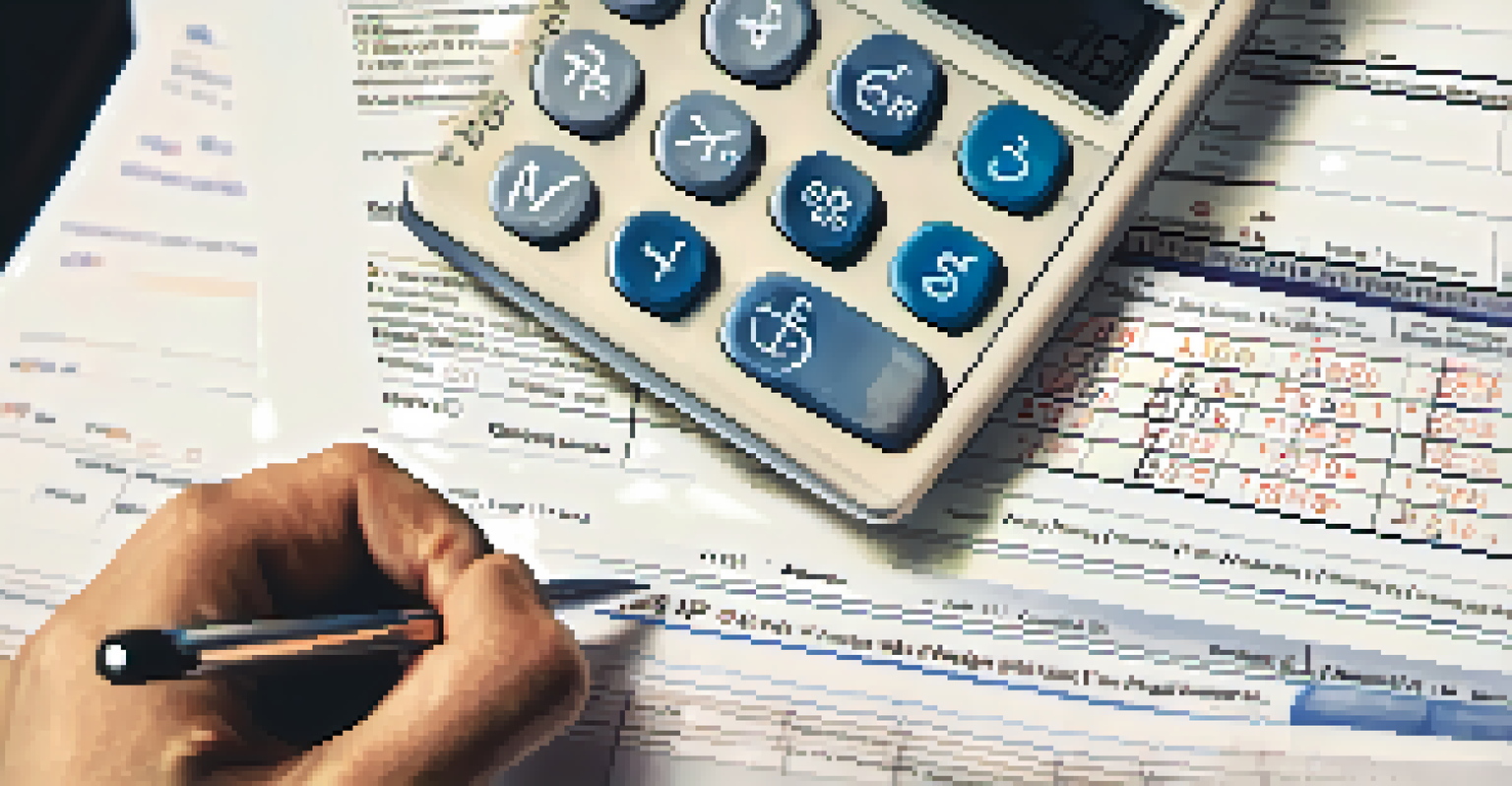Planning for Tax Season: Tips for Financial Wellness

Understanding the Importance of Tax Planning
Tax planning is more than just preparing your returns; it's about making informed financial decisions throughout the year. By understanding your tax obligations, you can maximize deductions and credits, which ultimately enhances your financial wellness. Think of tax planning as a roadmap that guides you to your financial goals while avoiding costly pitfalls.
The best way to predict your future is to create it.
Many people wait until the last minute to think about taxes, but this can lead to unnecessary stress and missed opportunities. By proactively planning, you can strategize on how to minimize your tax bill and even invest those savings into your future. Just like a well-timed trip to the grocery store can help you avoid last-minute takeout, a little tax planning can save you a lot of money.
In short, embracing tax planning allows you to take control of your finances. Instead of feeling overwhelmed come tax season, you'll be empowered with strategies that align with your overall financial health. This shift in mindset can make all the difference in your approach to taxes.
Organizing Your Financial Documents Early
One of the best ways to prepare for tax season is to organize your financial documents well in advance. Gather essential documents like W-2s, 1099s, and receipts for deductible expenses. Creating a dedicated folder—either physical or digital—can help you keep everything in one place, making it easier when it's time to file your taxes.

Consider setting aside a small amount of time each month to review and organize your documents. This small investment of time can save you hours of frustration when tax season rolls around. Plus, having everything organized means you're less likely to miss out on deductions that could save you money.
Proactive Tax Planning Saves Money
By embracing tax planning throughout the year, you can maximize deductions and credits, ultimately enhancing your financial wellness.
By making document organization a regular habit, you not only ease your tax season burden but also gain valuable insights into your spending habits. This practice can help you make better financial decisions throughout the year and foster a healthier relationship with your finances.
Exploring Tax Deductions and Credits
Tax deductions and credits can significantly reduce your tax liability, so it's essential to understand what you're eligible for. Deductions lower your taxable income, while credits reduce your tax bill dollar-for-dollar. Familiarizing yourself with both can feel like finding hidden treasures in your financial journey.
Tax planning is like a puzzle; the more pieces you know, the clearer the picture becomes.
Common deductions include mortgage interest, student loan interest, and medical expenses, while credits might be available for education expenses or energy-efficient home improvements. It's helpful to keep a checklist of potential deductions and credits to ensure you don't miss out on any opportunities. Just like keeping a grocery list can help you stick to your budget, a tax checklist can help you maximize your savings.
Many taxpayers overlook valuable deductions and credits simply because they don't know they exist. By doing a little research and possibly consulting with a tax professional, you can uncover savings that can keep more money in your pocket. Remember, every bit counts when it comes to financial wellness.
Setting Up a Tax-Advantaged Savings Account
A tax-advantaged savings account can be a powerful tool for your financial wellness. Accounts like Health Savings Accounts (HSAs) or Flexible Spending Accounts (FSAs) allow you to set aside pre-tax dollars for medical expenses. This means you're effectively lowering your taxable income while saving for future healthcare costs.
Additionally, accounts like IRAs (Individual Retirement Accounts) offer tax benefits that can help you save for retirement while potentially reducing your current tax burden. By contributing to these accounts, you're not only preparing for future financial needs but also enhancing your overall tax strategy.
Organize Documents for Easier Filing
Regularly organizing financial documents helps streamline the tax filing process and ensures you don't miss out on valuable deductions.
Establishing a tax-advantaged savings account is like planting a seed for future growth. Over time, these savings can accumulate and blossom into significant financial resources, giving you peace of mind as tax season approaches and beyond.
Consulting with a Tax Professional
While DIY tax preparation is an option for many, consulting with a tax professional can provide valuable insights tailored to your unique financial situation. Tax professionals can help you navigate complex tax laws, identify deductions you might have missed, and offer strategic advice for minimizing your tax liability. Think of them as the GPS for your tax journey.
Many people find that the cost of hiring a tax professional is outweighed by the potential savings they can secure. After all, it's their job to stay updated on changing tax regulations, which can be a daunting task for the average taxpayer. Having an expert in your corner can provide not just peace of mind but also a sense of empowerment in your financial decisions.
In addition to tax preparation, professionals can help you create a long-term tax strategy that aligns with your financial goals. This proactive approach can lead to significant savings year after year, making it a wise investment in your financial wellness.
Creating a Tax Payment Plan
If you find yourself owing taxes, it's essential to create a tax payment plan. Ignoring tax bills can lead to penalties and interest, making your financial situation even more challenging. Just like budgeting for monthly expenses, having a plan for paying your taxes can alleviate stress and keep your finances on track.
Start by assessing how much you owe and when it's due. Then, break that total into manageable monthly payments that fit into your budget. This approach not only helps you avoid large lump-sum payments but also keeps your financial wellness intact.
Consult Professionals for Expert Guidance
Engaging a tax professional can provide tailored insights and strategies, helping you navigate complex tax laws and maximize your savings.
In addition, the IRS offers payment plans that can help you spread out your tax payments over time. Taking proactive steps to manage your tax obligations shows a commitment to financial responsibility and can pave the way for a more secure financial future.
Reviewing Your Financial Goals Post-Tax Season
Once tax season is behind you, it's a great time to review your financial goals. Reflecting on your tax situation can provide insights into your spending habits, savings, and investment strategies. This post-tax season review can feel like a refreshing spring cleaning for your finances.
Consider what worked well during tax season and what areas need improvement. Did you miss out on deductions? Did you find it challenging to gather documents? Addressing these questions can help you create a more effective tax strategy for the upcoming year.

By regularly reviewing your financial goals, you stay proactive rather than reactive. This practice fosters a habit of continuous improvement, ensuring that you remain on track toward achieving your financial dreams.